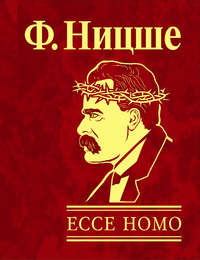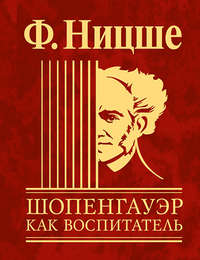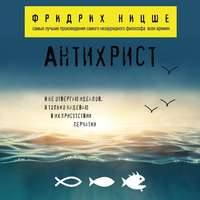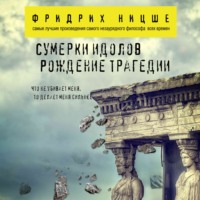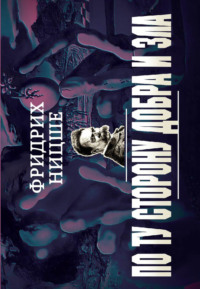 полная версия
полная версияHuman, All-Too-Human: A Book For Free Spirits; Part II
Authors' Copiousness. – The last quality that a good author acquires is copiousness: whoever has it to begin with will never become a good author. The noblest racehorses are lean until they are permitted to rest from their victories.
142Wheezing Heroes. – Poets and artists who suffer from a narrow chest of the emotions generally make their heroes wheeze. They do not know what easy breathing means.
143The Short-Sighted.22– The short-sighted are the deadly foes of all authors who let themselves go. These authors should know the wrath with which these people shut the book in which they observe that its creator needs fifty pages to express five ideas. And the cause of their wrath is that they have endangered what remains of their vision almost without compensation. A short-sighted person said, “All authors let themselves go.” “Even the Holy Ghost?” “Even the Holy Ghost.” But he had a right to, for he wrote for those who had lost their sight altogether.
144The Style of Immortality. – Thucydides and Tacitus both imagined immortal life for their works when they executed them. That might be guessed (if not known otherwise) from their style. The one thought to give permanence to his ideas by salting them, the other by boiling them down; and neither, it seems, made a miscalculation.
145Against Images and Similes. – By images and similes we convince, but we do not prove. That is why science has such a horror of images and similes. Science does not want to convince or make plausible, and rather seeks to provoke cold distrust by its mode of expression, by the bareness of its walls. For distrust is the touchstone for the gold of certainty.
146Caution. – In Germany, he who lacks thorough knowledge should beware of writing. The good German does not say in that case “he is ignorant,” but “he is of doubtful character.” – This hasty conclusion, by the way, does great credit to the Germans.
147Painted Skeletons. – Painted skeletons are those authors who try to make up for their want of flesh by artistic colourings.
148The Grand Style and Something Better. – It is easier to learn how to write the grand style than how to write easily and simply. The reasons for this are inextricably bound up with morality.
149Sebastian Bach. – In so far as we do not hear Bach's music as perfect and experienced connoisseurs of counterpoint and all the varieties of the fugal style (and accordingly must dispense with real artistic enjoyment), we shall feel in listening to his music – in Goethe's magnificent phrase – as if “we were present at God's creation of the world.” In other words, we feel here that something great is in the making but not yet made – our mighty modern music, which by conquering nationalities, the Church, and counterpoint has conquered the world. In Bach there is still too much crude Christianity, crude Germanism, crude scholasticism. He stands on the threshold of modern European music, but turns from thence to look at the Middle Ages.
150Händel. – Händel, who in the invention of his music was bold, original, truthful, powerful, inclined to and akin to all the heroism of which a nation is capable, often proved stiff, cold, nay even weary of himself in composition. He applied a few well-tried methods of execution, wrote copiously and quickly, and was glad when he had finished – but that joy was not the joy of God and other creators in the eventide of their working day.
151Haydn. – So far as genius can exist in a man who is merely good, Haydn had genius. He went just as far as the limit which morality sets to intellect, and only wrote music that has “no past.”
152Beethoven and Mozart. – Beethoven's music often appears like a deeply emotional meditation on unexpectedly hearing once more a piece long thought to be forgotten, “Tonal Innocence”: it is music about music. In the song of the beggar and child in the street, in the monotonous airs of vagrant Italians, in the dance of the village inn or in carnival nights he discovers his melodies. He stores them together like a bee, snatching here and there some notes or a short phrase. To him these are hallowed memories of “the better world,” like the ideas of Plato. – Mozart stands in quite a different relation to his melodies. He finds his inspiration not in hearing music but in gazing at life, at the most stirring life of southern lands. He was always dreaming of Italy, when he was not there.
153Recitative. – Formerly recitative was dry, but now we live in the age of moist recitative. It has fallen into the water, and the waves carry it whithersoever they list.
154“Cheerful” Music. – If for a long time we have heard no music, it then goes like a heavy southern wine all too quickly into the blood and leaves behind it a soul dazed with narcotics, half-awake, longing for sleep. This is particularly the case with cheerful music, which inspires in us bitterness and pain, satiety and home-sickness together, and forces us to sip again and again as at a sweetened draught of poison. The hall of gay, noisy merriment then seems to grow narrow, the light to lose its brightness and become browner. At last we feel as if this music were penetrating to a prison where a poor wretch cannot sleep for home-sickness.
155Franz Schubert. – Franz Schubert, inferior as an artist to the other great musicians, had nevertheless the largest share of inherited musical wealth. He spent it with a free hand and a kind heart, so that for a few centuries musicians will continue to nibble at his ideas and inspirations. In his works we find a store of unused inventions; the greatness of others will lie in making use of those inventions. If Beethoven may be called the ideal listener for a troubadour, Schubert has a right to be called the ideal troubadour.
156Modern Musical Execution. – Great tragic or dramatic execution of music acquires its character by imitating the gesture of the great sinner, such as Christianity conceives and desires him: the slow-stepping, passionately brooding man, distracted by the agonies of conscience, now flying in terror, now clutching with delight, now standing still in despair – and all the other marks of great sinfulness. Only on the Christian assumption that all men are great sinners and do nothing but sin could we justify the application of this style of execution to all music. So far, music would be the reflection of all the actions and impulses of man, and would continually have to express by gestures the language of the great sinner. At such a performance, a listener who was not enough of a Christian to understand this logic might indeed cry out in horror, “For the love of Heaven, how did sin find its way into music?”
157Felix Mendelssohn. – Felix Mendelssohn's music is the music of the good taste that enjoys all the good things that have ever existed. It always points behind. How could it have much “in front,” much of a future? – But did he want it to have a future? He possessed a virtue rare among artists, that of gratitude without arrière-pensée. This virtue, too, always points behind.
158A Mother of Arts. – In our sceptical age, real devotion requires almost a brutal heroism of ambition. Fanatical shutting of the eyes and bending of the knee no longer suffice. Would it not be possible for ambition – in its eagerness to be the last devotee of all the ages – to become the begetter of a final church music, as it has been the begetter of the final church architecture? (They call it the Jesuit style.)
159Freedom in Fetters – a Princely Freedom. – Chopin, the last of the modern musicians, who gazed at and worshipped beauty, like Leopardi; Chopin, the Pole, the inimitable (none that came before or after him has a right to this name) – Chopin had the same princely punctilio in convention that Raphael shows in the use of the simplest traditional colours. The only difference is that Chopin applies them not to colour but to melodic and rhythmic traditions. He admitted the validity of these traditions because he was born under the sway of etiquette. But in these fetters he plays and dances as the freest and daintiest of spirits, and, be it observed, he does not spurn the chain.
160Chopin's Barcarolle. – Almost all states and modes of life have a moment of rapture, and good artists know how to discover that moment. Such a moment there is even in life by the seashore – that dreary, sordid, unhealthy existence, dragged out in the neighbourhood of a noisy and covetous rabble. This moment of rapture Chopin in his Barcarolle expressed in sound so supremely that Gods themselves, when they heard it, might yearn to lie long summer evenings in a boat.
161Robert Schumann. – “The Stripling,” as the romantic songsters of Germany and France of the first three decades of this century imagined him – this stripling was completely translated into song and melody by Robert Schumann, the eternal youth, so long as he felt himself in full possession of his powers. There are indeed moments when his music reminds one of the eternal “old maid.”
162Dramatic Singers. – “Why does this beggar sing?” “Probably he does not know how to wail.” “Then he does right.” But our dramatic singers, who wail because they do not know how to sing – are they also in the right?
163Dramatic Music. – For him who does not see what is happening on the stage, dramatic music is a monstrosity, just as the running commentary to a lost text is a monstrosity. Such music requires us to have ears where our eyes are. This, however, is doing violence to Euterpe, who, poor Muse, wants to have her eyes and ears where the other Muses have theirs.
164Victory and Reasonableness. – Unfortunately in the æsthetic wars, which artists provoke by their works and apologias for their works, just as is the case in real war, it is might and not reason that decides. All the world now assumes as a historical fact that, in his dispute with Piccini, Gluck was in the right. At any rate, he was victorious, and had might on his side.
165Of the Principle of Musical Execution. – Do the modern musical performers really believe that the supreme law of their art is to give every piece as much high-relief as is possible, and to make it speak at all costs a dramatic language? Is not this principle, when applied for example to Mozart, a veritable sin against the spirit – the gay, sunny, airy, delicate spirit – of Mozart, whose seriousness was of a kindly and not awe-inspiring order, whose pictures do not try to leap from the wall and drive away the beholder in panic? Or do you think that all Mozart's music is identical with the statue-music in Don Juan? And not only Mozart's, but all music? – You reply that the advantage of your principle lies in its greater effect. You would be right if there did not remain the counter-question, “On whom has the effect operated, and on whom should an artist of the first rank desire to produce his effect?” Never on the populace! Never on the immature! Never on the morbidly sensitive! Never on the diseased! And above all – never on the blasé!
166The Music of To-Day. – This ultra-modern music, with its strong lungs and weak nerves, is frightened above all things of itself.
167Where Music is at Home. – Music reaches its high-water mark only among men who have not the ability or the right to argue. Accordingly, its chief promoters are princes, whose aim is that there should be not much criticism nor even much thought in their neighbourhood. Next come societies which, under some pressure or other (political or religious), are forced to become habituated to silence, and so feel all the greater need of spells to charm away emotional ennui – these spells being generally eternal love-making and eternal music. Thirdly, we must reckon whole nations in which there is no “society,” but all the greater number of individuals with a bent towards solitude, mystical thinking, and a reverence for all that is inexpressible; these are the genuine “musical souls.” The Greeks, as a nation delighting in talking and argument, accordingly put up with music only as an hors d'œuvre to those arts which really admit of discussion and dispute. About music one can hardly even think clearly. The Pythagoreans, who in so many respects were exceptional Greeks, are said to have been great musicians. This was the school that invented a five-years' silence,23 but did not invent a dialectic.
168Sentimentality in Music. – We may be ever so much in sympathy with serious and profound music, yet nevertheless, or perhaps all the more for that reason, we shall at occasional moments be overpowered, entranced, and almost melted away by its opposite – I mean, by those simple Italian operatic airs which, in spite of all their monotony of rhythm and childishness of harmony, seem at times to sing to us like the very soul of music. Admit this or not as you please, you Pharisees of good taste, it is so, and it is my present task to propound the riddle that it is so, and to nibble a little myself at the solution. – In childhood's days we tasted the honey of many things for the first time. Never was honey so good as then; it seduced us to life, into abundant life, in the guise of the first spring, the first flower, the first butterfly, the first friendship. Then – perhaps in our ninth year or so – we heard our first music, and this was the first that we understood; thus the simplest and most childish tunes, that were not much more than a sequel to the nurse's lullaby and the strolling fiddler's tune, were our first experience. (For even the most trifling “revelations” of art need preparation and study; there is no “immediate” effect of art, whatever charming fables the philosophers may tell.) Our sensation on hearing these Italian airs is associated with those first musical raptures, the strongest of our lives. The bliss of childhood and its flight, the feeling that our most precious possession can never be brought back, all this moves the chords of the soul more strongly than the most serious and profound music can move them. – This mingling of æsthetic pleasure with moral pain, which nowadays it is customary to call (rather too haughtily, I think) “sentimentality” – it is the mood of Faust at the end of the first scene – this “sentimentality” of the listener is all to the advantage of Italian music. It is a feeling which the experienced connoisseurs in art, the pure “æsthetes,” like to ignore. – Moreover, almost all music has a magical effect only when we hear it speak the language of our own past. Accordingly, it seems to the layman that all the old music is continually growing better, and that all the latest is of little value. For the latter arouses no “sentimentality,” that most essential element of happiness, as aforesaid, for every man who cannot approach this art with pure æsthetic enjoyment.
169As Friends of Music. – Ultimately we are and remain good friends with music, as we are with the light of the moon. Neither, after all, tries to supplant the sun: they only want to illumine our nights to the best of their powers. Yet we may jest and laugh at them, may we not? Just a little, at least, and from time to time? At the man in the moon, at the woman in the music?
170Art in an Age of Work. – We have the conscience of an industrious epoch. This debars us from devoting our best hours and the best part of our days to art, even though that art be the greatest and worthiest. Art is for us a matter of leisure, of recreation, and we consecrate to it the residue of our time and strength. This is the cardinal fact that has altered the relation of art to life. When art makes its great demands of time and strength upon its recipients, it has to battle against the conscience of the industrious and efficient, it is relegated to the idle and conscienceless, who, by their very nature, are not exactly suited to great art, and consider its claims arrogant. It might, therefore, be all over with art, since it lacks air and the power to breathe. But perhaps the great art attempts, by a sort of coarsening and disguising, to make itself at home in that other atmosphere, or at least to put up with it – an atmosphere which is really a natural element only for petty art, the art of recreation, of pleasant distraction. This happens nowadays almost everywhere. Even the exponents of great art promise recreation and distraction; even they address themselves to the exhausted; even they demand from him the evening hours of his working-day – just like the artists of the entertaining school, who are content to smooth the furrowed brow and brighten the lack-lustre eye. What, then, are the devices of their mightier brethren? These have in their medicine-chests the most powerful excitants, which might give a shock even to a man half-dead: they can deafen you, intoxicate you, make you shudder, or bring tears to your eyes. By this means they overpower the exhausted man and stimulate him for one night to an over-lively condition, to an ecstasy of terror and delight. This great art, as it now lives in opera, tragedy, and music – have we a right to be angry with it, because of its perilous fascination, as we should be angry with a cunning courtesan? Certainly not. It would far rather live in the pure element of morning calm, and would far rather make its appeal to the fresh, expectant, vigorous morning-soul of the beholder or listener. Let us be thankful that it prefers living thus to vanishing altogether. But let us also confess that an era that once more introduces free and complete high-days and holidays into life will have no use for our great art.
171The Employees of Science and the Others. – Really efficient and successful men of science might be collectively called “The Employees.” If in youth their acumen is sufficiently practised, their memory is full, and hand and eye have acquired sureness, they are appointed by an older fellow-craftsman to a scientific position where their qualities may prove useful. Later on, when they have themselves gained an eye for the gaps and defects in their science, they place themselves in whatever position they are needed. These persons all exist for the sake of science. But there are rarer spirits, spirits that seldom succeed or fully mature – “for whose sake science exists” – at least, in their view. They are often unpleasant, conceited, or cross-grained men, but almost always prodigies to a certain extent. They are neither employees nor employers; they make use of what those others have worked out and established, with a certain princely carelessness and with little and rare praise – just as if the others belonged to a lower order of beings. Yet they possess the same qualities as their fellow-workers, and that sometimes in a less developed form. Moreover, they have a peculiar limitation, from which the others are free; this makes it impossible to put them into a place and to see in them useful tools. They can only live in their own air and on their own soil. This limitation suggests to them what elements of a science “are theirs” – in other words, what they can carry home into their house and atmosphere: they think that they are always collecting their scattered “property.” If they are prevented from building at their own nest, they perish like shelterless birds. The loss of freedom causes them to wilt away. If they show, like their colleagues, a fondness for certain regions of science, it is always only regions where the fruits and seeds necessary to them can thrive. What do they care whether science, taken as a whole, has untilled or badly tilled regions? They lack all impersonal interest in a scientific problem. As they are themselves personal through and through, all their knowledge and ideas are remoulded into a person, into a living complexity, with its parts interdependent, overlapping, jointly nurtured, and with a peculiar atmosphere and scent as a whole. – Such natures, with their system of personal knowledge, produce the illusion that a science (or even the whole of philosophy) is finished and has reached its goal. The life in their system works this magic, which at times has been fatal to science and deceptive to the really efficient workers above described, and at other times, when drought and exhaustion prevailed, has acted as a kind of restorative, as if it were the air of a cool, refreshing resting-place. – These men are usually called philosophers.
172Recognition of Talent. – As I went through the village of S., a boy began to crack his whip with all his might – he had made great progress in this art, and he knew it. I threw him a look of recognition – in reality it hurt me cruelly. We do the same in our recognition of many of the talents. We do good to them when they hurt us.
173Laughing and Smiling. – The more joyful and assured the mind becomes, the more man loses the habit of loud laughter. In compensation, there is an intellectual smile continually bubbling up in him, a sign of his astonishment at the innumerable concealed delights of a good existence.
174The Talk of Invalids. – Just as in spiritual grief we tear our hair, strike our foreheads, lacerate our cheeks or even (like Œdipus) gouge our eyes out, so against violent physical pain we call to our aid a bitter, violent emotion, through the recollection of slanderous and malignant people, through the denigration of our future, through the sword-pricks and acts of malice which we mentally direct against the absent. And at times it is true that one devil drives out another – but then we have the other. – Hence a different sort of talk, tending to alleviate pain, should be recommended invalids: reflections upon the kindnesses and courtesies that can be performed towards friend and foe.
175Mediocrity as a Mask. – Mediocrity is the happiest mask which the superior mind can wear, because it does not lead the great majority – that is, the mediocre – to think that there is any disguise. Yet the superior mind assumes the mask just for their sake – so as not to irritate them, nay, often from a feeling of pity and kindness.
176The Patient. – The pine tree seems to listen, the fir tree to wait, and both without impatience. They do not give a thought to the petty human being below who is consumed by his impatience and his curiosity.
177The Best Joker. – My favourite joke is the one that takes the place of a heavy and rather hesitating idea, and that at once beckons with its finger and winks its eye.
178The Accessaries of all Reverence. – Wherever the past is revered, the over-cleanly and over-tidy people should not be admitted. Piety does not feel content without a little dust, dirt, and dross.
179The Great Danger of Savants. – It is just the most thorough and profound savants who are in peril of seeing their life's goal set ever lower and lower, and, with a feeling of this in their minds, to become ever more discouraged and more unendurable in the latter half of their lives. At first they plunge into their science with spacious hopes and set themselves daring tasks, the ends of which are already anticipated by their imaginations. Then there are moments as in the lives of the great maritime discoverers – knowledge, presentiment, and power raise each other higher and higher, until a new shore first dawns upon the eye in the far distance. But now the stern man recognises more and more how important it is that the individual task of the inquirer should be limited as far as possible, so that it may be entirely accomplished and the intolerable waste of force from which earlier periods of science suffered may be avoided. In those days everything was done ten times over, and then the eleventh always had the last and best word. Yet the more the savant learns and practises this art of solving riddles in their entirety, the more pleasure he finds in so doing. But at the same time his demands upon what is here called “entirety” grow more exacting. He sets aside everything that must remain in this sense incomplete, he acquires a disgust and an acute scent for the half-soluble – for all that can only give a kind of certainty in a general and indefinite form. His youthful plans crumble away before his eyes. There remains scarcely anything but a few little knots, in untying which the master now takes his pleasure and shows his strength. Then, in the midst of all this useful, restless activity, he, now grown old, is suddenly then often overcome by a deep misgiving, a sort of torment of conscience. He looks upon himself as one changed, as if he were diminished, humbled, transformed into a dexterous dwarf; he grows anxious as to whether mastery in small matters be not a convenience, an escape from the summons to greatness in life and form. But he cannot pass beyond any longer – the time for that has gone by.



